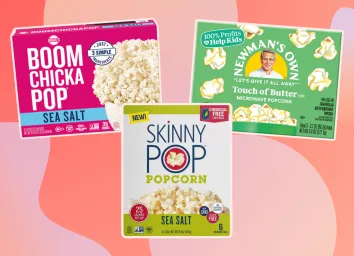One Major Side Effect of Eating Popcorn, Says Science

From the type served in movie theater buckets to the kind you make at home, there's no denying that popcorn is one of America's most popular snacks. However, even if you consider yourself a regular kernel connoisseur, there's plenty about this beloved food you likely don't know—particularly when it comes to your health.
If you're a fan of this poppable snack, there's a surprising popcorn side effect you may not be aware of: eating popcorn may help reduce your risk of cardiovascular disease.
"Popcorn is a whole grain, and therefore an excellent source of fiber and polyphenols. The fiber provided in popcorn helps remove cholesterol from the body, thereby reducing this substance that can be harmful to heart health," explains Trista Best, MPH, RD, LD, a registered dietitian with Balance One Supplements. (Related: 5 Drinks That May Lead to a Heart Attack, According to Science.)
"Polyphenols are plant compounds that act as antioxidants in the body. When we consume them through whole food sources, we are aiding our body in ridding itself of free radicals and toxins that can cause cellular damage and ultimately chronic illnesses," she adds.
In fact, according to a 2014 study published in Nutrition, Metabolism, & Cardiovascular Diseases, among a group of 7,172 adults, those whose diets had the highest levels of polyphenols had a 46 percent lower risk of cardiovascular disease compared to study subjects with the lowest levels of dietary polyphenols.
So, just how big a polyphenol boost are you getting when you eat popcorn? According to research presented at the 243rd National Meeting & Exposition of the American Chemical Society (ACS) in 2012, researchers from the University of Scranton found that a single serving of popcorn not only contains over 70 percent of the RDA of whole grains, it also packs more polyphenols per serving than fresh corn or any of the fruits the researchers compared the snack to.
However, you shouldn't expect to reap all those heart health benefits from any old type of popcorn—particularly if you're eating the oil-popped, butter-drenched stuff that comes in buckets at your local movie theater. "If popcorn is prepared using butter and oil, this benefit is essentially canceled," says Best. (See: The #1 Reason Why You Shouldn't Eat Microwave Popcorn.)
A large canola oil-popped popcorn served at AMC Theaters contains 980 calories, 44 grams of fat (including 3.5 grams of saturated fat), and a whopping 2400 milligrams of sodium—more than the upper limit of what the U.S. Food & Drug Administration (FDA) says is safe for an adult to consume in an entire day. Considering that both high-fat diets and excessive sodium consumption have been linked to heart disease, that oil and salt can quickly turn this otherwise healthy snack into a poor choice in terms of your heart health.
What's more, those jumbo-sized servings you get at a movie theater may cause you to eat more, which can trigger weight gain, which is also a known risk factor for heart disease. According to a 2005 study published in the Journal of Nutrition Education and Behavior, among a group of 158 moviegoers, even those served stale popcorn who reportedly disliked its taste ate 33.6 percent more of it when given a large container compared to those given a medium-sized one.
So, if you are going to enjoy this snack, make sure you're opting for the air-popped variety, use spices instead of salt or high-fat toppings to season it, and limit yourself to a few cups at a time. Want to discover what else popcorn could be doing to your body? Check out What Happens To Your Body When You Eat Popcorn.
For the latest food news delivered straight to your inbox, sign up for our newsletter.








